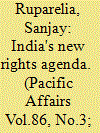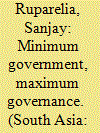|
|
|
Sort Order |
|
|
|
Items / Page
|
|
|
|
|
|
|
| Srl | Item |
| 1 |
ID:
128534


|
|
|
|
|
| Publication |
2013.
|
| Summary/Abstract |
Since 2004, India has introduced a series of progressive national bills that enact a right to new civic entitlements, ranging from information, work and education to forest conservation, food and basic public services. What explains the emergence of these laws? How are the rights conceived by these acts conceptualized, operationalized and pursued? What are the promises, challenges and risks-legal, political and economic-of enshrining socioeconomic entitlements as formal statutory rights? This paper engages these questions. In part 1, I argue that three slow-burning processes since the 1980s, distinct yet related, catalyzed India's new rights agenda: high socio-legal activism, rapid uneven development and the expanding popular foundations of its federal parliamentary democracy. Significantly, all three processes exposed the growing nexus between political corruption and socioeconomic inequality. Equally, however, each raised popular expectations for greater social justice that were only partly met. Part 2 of the paper evaluates India's new rights agenda. The promise of these new laws is threefold: they breach the traditional division of civil, political and socioeconomic rights, devise innovative governance mechanisms that enable citizens to see the state and provide fresh incentives for new political coalitions to emerge across state and society. Several risks exist, however. Official political resistance from above and below, the limited capacities of judicial actors, state bureaucracies and social forces and the relatively narrow base of many of these new movements endanger the potential of these reforms. The paper concludes by considering several imperatives that India's evolving rights movement must confront to realize its ambition.
|
|
|
|
|
|
|
|
|
|
|
|
|
|
|
|
| 2 |
ID:
142841


|
|
|
|
|
| Summary/Abstract |
This article examines the politics of development during the first year of the new Modi government. In particular, it explores the meaning of its guiding maxim, ‘Minimum Government, Maximum Governance’, by analysing specific reforms and broader changes in state–society relations. First, the Modi government has imposed greater discipline in public administration through a personalistic, centralised and technocratic style of rule. But it has bolstered executive power by limiting political transparency, parliamentary government and social dissent. Second, the new government has promoted urbanisation, manufacturing and infrastructure through greater economic liberalisation, public investment and institutional reform. Yet it has weakened many labour protocols, environmental regulations and participatory mechanisms regarding land acquisition and forest conservation. Lastly, the Modi administration has introduced new insurance schemes and championed digitally-enabled cash transfers to deliver social entitlements. However, it has reduced public spending on primary education and basic health, and undercut many rights-based welfare acts introduced by the previous administration, the United Progressive Alliance (UPA). These three trends have narrowed the spaces of power and contestation in contemporary Indian democracy, frustrating the promise of ‘maximum governance’.
|
|
|
|
|
|
|
|
|
|
|
|
|
|
|
|
|
|
|
|
|